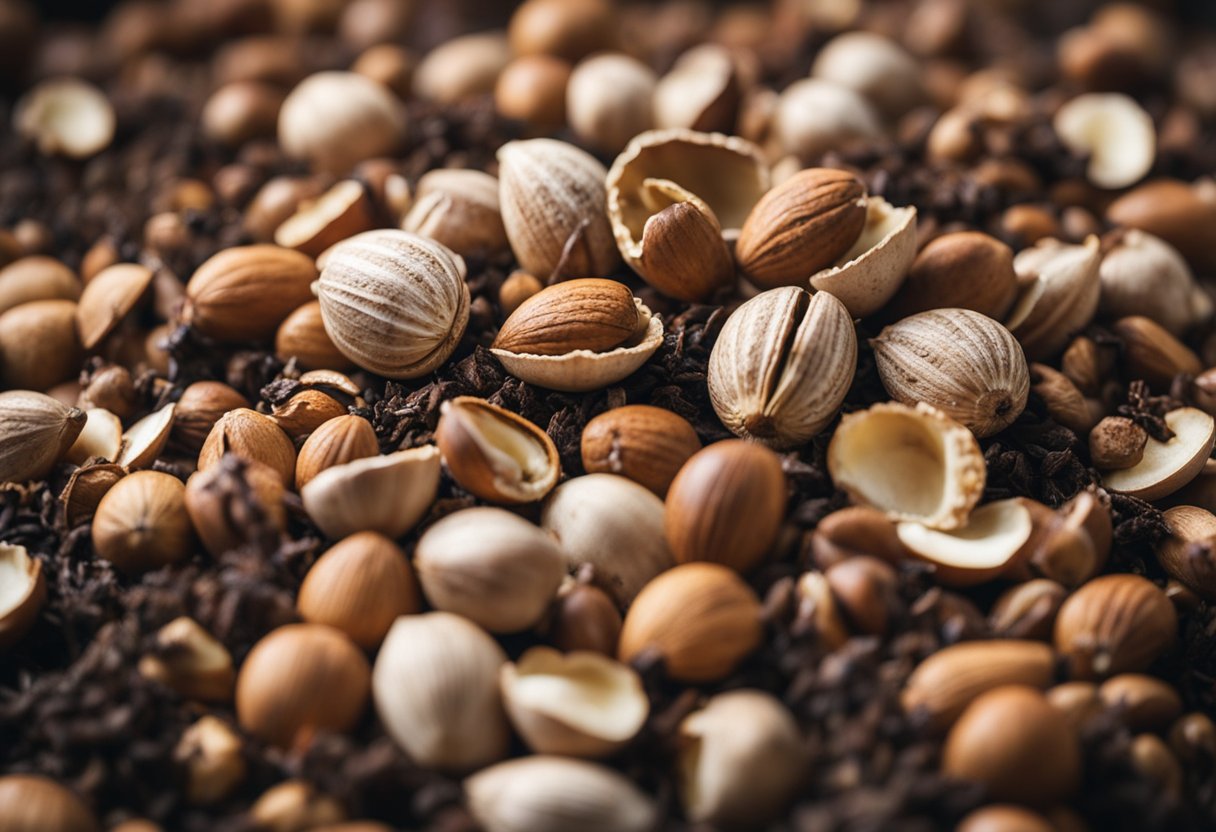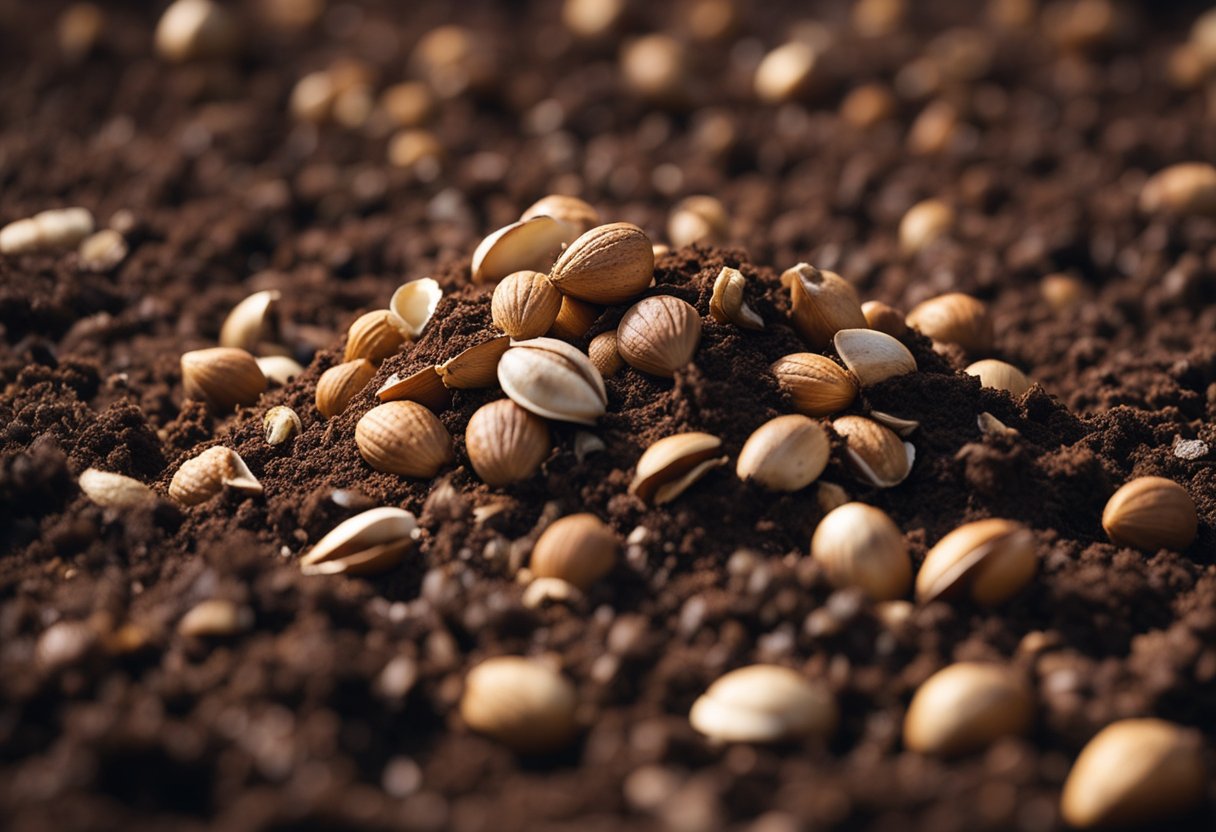As an Amazon Associate I earn from qualifying purchases.
At A Glance
Yes, you can compost nut shells, but there are certain considerations to be aware of. Nut shells are considered brown compost material, meaning they provide carbon to the compost pile. They are quite tough and can take longer to decompose compared to other compost materials. It’s advisable to crush or break them into smaller pieces to expedite the decomposition process. Additionally, ensure the nut shells haven’t been treated with pesticides or other chemicals as these can be harmful to your compost pile and later to your garden.
Composting is a great way to recycle organic waste and turn it into nutrient-rich soil for your garden. However, when it comes to composting, there are often questions about what can and cannot be composted. One such question is whether nut shells can be composted.
The answer is yes, nut shells can be composted. Nut shells are a great source of nitrogen, phosphorus, and potassium, which are essential nutrients for plant growth. However, it’s important to note that nut shells decompose slowly, so they should be broken down into smaller pieces before adding them to your compost pile. One way to do this is to run over the shells with your car or use a hammer to break them into smaller pieces. Once the shells are broken down, they can be added to your compost pile along with other organic materials like leaves, grass clippings, and food scraps.
It’s also worth noting that some types of nut shells, like walnut shells, can contain allelopathic compounds that can inhibit the growth of other plants. So, if you’re planning to use your compost in a vegetable garden, it’s best to avoid adding walnut shells to your compost pile. Overall, nut shells can be a great addition to your compost pile, as long as they’re broken down into smaller pieces and used in moderation.
Understanding Composting

Composting is the process of breaking down organic matter into nutrient-rich soil. This is done by creating the ideal conditions for microorganisms to decompose the materials. The process of decomposition requires four key elements: nitrogen, carbon, oxygen, and moisture.
Nitrogen is a key ingredient in green materials, such as grass clippings and vegetable scraps. Carbon is found in brown materials, such as dried leaves and wood chips. The balance between these two ingredients is important for the decomposition process. A good rule of thumb is to have a ratio of 25-30 parts carbon to 1 part nitrogen.
The decomposition process also requires oxygen and moisture. Oxygen is necessary for the microorganisms to break down the materials. This is why it is important to turn your compost pile regularly to ensure adequate aeration. Moisture is also important, as it helps to keep the microorganisms alive and active.
Green ingredients, such as fruit and vegetable scraps, provide nitrogen to the compost pile. Brown ingredients, such as dried leaves and wood chips, provide carbon. It is important to have a balance of both green and brown ingredients in your compost pile.
Carbon-based ingredients, such as nut shells, are considered brown materials and provide carbon to the compost pile. Nut shells can be composted, but their woody nature means they will break down more slowly, taking 6 to 24 months. Some of the best nut shells for composting are pistachio nut shells, peanut shells, and almond shells.
Aeration is important in the composting process, as it helps to introduce oxygen to the microorganisms. This can be achieved by turning your compost pile regularly or by using a compost tumbler.
In conclusion, composting is a great way to turn organic matter into nutrient-rich soil. By understanding the balance of nitrogen and carbon, and providing adequate aeration and moisture, you can create the perfect environment for microorganisms to break down your organic matter. Nut shells can be composted, but it is important to remember that they are considered brown materials and will take longer to break down than green materials.
Nut Shells in Composting
Composting is a great way to reduce waste and create nutrient-rich soil for your garden. Nut shells are a common waste item that can be composted, but there are some things to keep in mind when composting them.
Types of Nut Shells
There are many types of nut shells that can be composted, including peanuts, walnuts, pistachios, and hickory nuts. However, some nut shells, such as black walnut shells, contain a chemical called juglone that can be toxic to plants. It is best to avoid composting black walnut shells.
Benefits of Nut Shells in Composting
Nut shells are a great addition to your compost pile because they provide both carbon and nitrogen, which are essential for the composting process. They also act as a bulking agent to improve the structure of your compost pile while boosting aeration. Nut shells can help to improve the quality of your soil by adding nutrients and improving drainage.
Potential Issues with Nut Shells in Composting
One potential issue with composting nut shells is that they are woody and can take a long time to decompose. It can take anywhere from 6 to 24 months for nut shells to break down completely. To speed up the process, you can shred the nut shells or break them into small pieces before adding them to your compost pile.
Another potential issue is that some nut shells, such as those from salted peanuts, can contain excess salt. If you are composting salted nut shells, it is best to soak them in water for at least 12 hours or rinse them thoroughly to remove the excess salt before adding them to your compost pile.
Finally, as mentioned earlier, black walnut shells should be avoided when composting because they contain juglone, which can be toxic to plants.
How to Compost Nut Shells
To compost nut shells, simply add them to your compost pile along with other organic materials such as leaves, grass clippings, and food scraps. It is important to maintain a balance of carbon and nitrogen in your compost pile, so be sure to add other sources of carbon such as dried leaves or sawdust.
You can also use nut shells as mulch in your garden beds. Simply spread a layer of nut shells over the soil around your plants. Nut shells can help to retain moisture in the soil and prevent weed growth.
Tips for Composting Nut Shells
- Shred or break nut shells into small pieces to speed up the composting process.
- Avoid composting black walnut shells.
- Soak salted nut shells in water or rinse them thoroughly to remove excess salt before adding them to your compost pile.
- Maintain a balance of carbon and nitrogen in your compost pile by adding other sources of carbon such as dried leaves or sawdust.
- Use nut shells as mulch in your garden beds to retain moisture and prevent weed growth.
The Composting Process

Composting is the process of breaking down organic matter into fine compost that can be used as a soil amendment. Nut shells can be composted, although being woody means they will break down more slowly, taking 6 to 24 months. Composting nut shells is a great way to reduce waste and create a nutrient-rich soil amendment for your garden. In this section, I will discuss the two methods of composting: hot composting and cold composting.
Hot Composting
Hot composting is a quicker method of composting that requires more effort and maintenance. The compost heap needs to be kept moist but not too wet, and the materials need to be turned regularly to provide oxygen to the bacteria that are breaking down the organic matter. Hot composting requires a ratio of 2:1 brown ingredients (dry, carbon-rich materials like nut shells) to green ingredients (wet, nitrogen-rich materials like grass clippings).
Cold Composting
Cold composting is a slower method of composting that requires less maintenance. The compost pile can be created in a compost bin or just in a pile in your yard. The materials are added to the pile as they become available and are left to break down over time. Cold composting does not require a specific ratio of brown to green ingredients, but it is important to keep the pile moist and turn it occasionally to provide oxygen to the bacteria breaking down the organic matter.
When composting nut shells, it is important to crush them into small pieces to speed up the decomposition process. Mix the broken nut shells with dried leaves, small twigs, and other brown ingredients until you have a 2-inch (5 cm) layer. Cover it with a similar layer of green ingredients, then some garden soil and a good watering. Make sure to turn the pile every two weeks to add oxygen, which will help the pile to heat faster.
In conclusion, composting nut shells is a great way to reduce waste and create a nutrient-rich soil amendment for your garden. Whether you choose to use hot composting or cold composting, make sure to crush the nut shells into small pieces and mix them with other brown ingredients. With a little effort and patience, you can create fine compost that will improve the health of your garden.
Precautions and Tips
When composting nut shells, it is important to keep in mind a few precautions and tips.
Firstly, it is best to avoid composting salted peanuts or any other salted nut shells. Salt can be harmful to plants and can also attract pests.
Secondly, nut shells are tough and can take a long time to decompose. To speed up the process, it is recommended to break the shells into smaller pieces before adding them to the compost pile.
Thirdly, nut shells can be a breeding ground for fungal diseases. To prevent this, make sure the compost pile is well-aerated and not too damp.
Lastly, it is important to balance the nut shells with other materials in the compost pile. Mixing them with green materials like vegetable scraps or grass clippings can help to balance the carbon-to-nitrogen ratio and ensure efficient decomposition.
By following these precautions and tips, you can successfully compost nut shells and turn them into a valuable addition to your garden soil.
